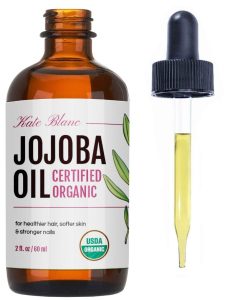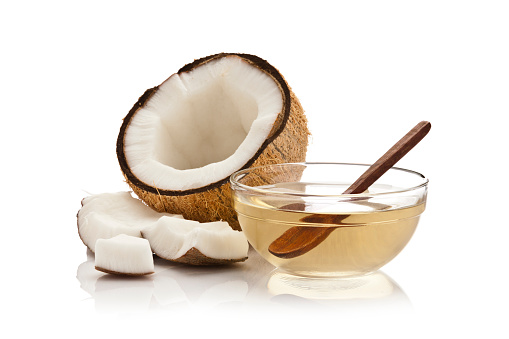
Sunflower Oil is used because it contains Oleic Acid, which makes it an excellent moisturizing agent. It can attract moisture from all directions, making skin soft and supple.
As you know both oils are great moisturizers and have many benefits but which one is better? And which one you should use? So, let’s discuss the benefits and differences between jojoba oil and sunflower oil.
Contents
- 1 Jojoba Oil Vs Sunflower Oil: Background
- 2 Jojoba Oil Vs Sunflower Oil: Differences
- 3 Jojoba Oil Vs Sunflower Oil Benefits
- 4 Jojoba Oil Vs Sunflower Oil: Which One Is Better?
- 5 Can I Mix Jojoba Oil With Sunflower Oil?
- 6 Jojoba Oil Vs Sunflower Oil For Hair
- 7 Jojoba Oil Vs Sunflower Oil For Skin
- 8 Jojoba Oil Vs Sunflower Oil For Oily And Acne-Prone Skin
- 9 Jojoba Oil Vs Sunflower Oil: Which One Is Better For Face?
- 10 Jojoba Oil Vs Sunflower Oil – Conclusion
Jojoba Oil Vs Sunflower Oil: Background
The sunflower was domesticated in Mexico between 5000 and 7000 BC. Sunflower Oil is derived from the seeds of sunflowers. It has a rich flavor which makes it popular in cooking, but also an oil with many health benefits when consumed.
Jojoba Oil is extracted from the seeds of the Jojoba plant(Simmondsia Chinensis), which has been used by Native Americans for centuries. The oil was bottled and sold as an expensive beauty product in Europe during the 1970s. It quickly became popular but was later discovered that it could be used to remove makeup more efficiently than any other oil.
But what are these oils exactly?
Sunflower oil is a yellow-golden and highly viscous liquid that is derived from the seeds of sunflowers. It has a nutty scent and taste, and it’s most often used as cooking oil or in beauty products such as soaps and lotions.
Jojoba oil is a liquid wax ester that’s found in the seeds of the jojoba plant. It also has a nutty scent and can be used as an all-purpose carrier oil. It’s especially popular with people who have dry or sensitive skin because it mimics human sebum (skin oil).
Both of the oils are primarily composed of fatty acids. Besides that, they’re extremely different from each other. So, let’s discuss the differences between these two.
Jojoba Oil Vs Sunflower Oil: Differences
As we have come to know the similarities are that these oils are 100% natural. These oils are used in different beauty and skincare products. But they are also different in many aspects. So, let’s discuss the differences between these oils.
1. Moisturizing Ability
Jojoba oil is more moisturizing than sunflower oil. Sunflower Oil is known to clog pores and cause acne because of its high oleic acid content. It may not be best for daily use on sensitive skin.
2. Texture And Feel
Sunflower oil is very oily and greasy. Jojoba oil absorbs fairly quickly into the skin, leaving it feeling softer and smoother. On the other hand, sunflower oil leaves your skin feeling greasy and sticky, but still soft because of its high oleic acid content.
3. Smell
Sunflower oil tends to have a strong and unpleasant smell to it. The scent is probably due to the extra processing that is required to get pure sunflower oil. There’s no need to worry about the smell of jojoba oil, which has a very faint nutty smell (similar to sesame oil or olive oil).
Reference Video – Things You Didn’t Know About Sunflower Oil
4. Baby Safe

There is nothing more precious than your baby’s skin. Sunflower oil may be good for you, but it isn’t so good on your baby’s sensitive skin. Jojoba is safe for babies and people with sensitive skin because it closely resembles the natural oils in our skin.
5. Shelf Life
Sunflower oil has a shelf life of 1 year. Meanwhile, jojoba oil can be stored for up to two years without any change in quality or spoilage.
6. Heating Ability
Jojoba oil is very resistant to heat and it doesn’t go rancid easily even after heating. Also, there are no trans fats in jojoba oil, whereas it is common to find them in sunflower oil.
7. Cold Creams

Sunflower oil was once used in cold creams back when people had no idea about skincare. Nowadays, scientists have discovered that using pure jojoba oil can be just as effective as sunflower oil in cold creams.
8. Sun Protection
Sunflower oil has an SPF of 6. This is nowhere near the recommended minimum of 15 for daily use. Jojoba oil, on the other hand, can be used as high as 30 SPF because it doesn’t contain any cholesterol – which helps to block UV damage.
9. High Oleic Acid Content And Dangers
Sunflower oil is high in oleic acid, a type of fatty acid that can be dangerous. Studies have shown that this type of fatty acid has been linked to pancreatic cancer and cardiovascular disease. There is much debate about what kinds of fatty acids are “good” for you, but it’s safe to say that oleic acid and trans-fats are not good for your health.
10. Storage
Sunflower oil is best stored in a place that is at least 35° F with 50% humidity to prevent spoiling. On the other hand, jojoba is more stable and can be stored at room temperature or cooler (up to 40° F).
11. Availability And Price
Sunflower oil is very cheap and it’s available at almost any grocery store. Jojoba oil can be expensive, depending on where you get it from.
12. Purity And What’s Inside
Sunflower oil is often refined, so it contains fewer nutrients. It is very important to buy pure sunflower oil if you are using it for cosmetic purposes. Jojoba oil is 100% pure, but there may be times when it’s mixed with other oils that don’t have the same benefits as jojoba.
Jojoba Oil Vs Sunflower Oil Benefits
Jojoba Oil Top Benefits
Jojoba oil is a liquid wax. It closely resembles the sebum that your skin naturally produces, making it perfect for moisturizing and nourishing skin. It also has anti-inflammatory properties, so it’s great to use on acne-prone skin.
Unlike many other natural oils, jojoba oil won’t go rancid easily or form toxic free radicals due to heat or oxygen. It is also more stable than many other natural oils, but it can begin to solidify if stored in a cold place for long periods. So, here is a list of benefits of jojoba oil.
1. Anti-Inflammatory
Jojoba oil has natural anti-inflammatory properties. It prevents skin irritation and inflammation as well as reduces the risk of heart disease and high blood pressure.
2. Skin Care And Moisturizer
There are so many benefits to using jojoba oil on your skin. It acts as a natural moisturizer and can penetrate deep into your skin, which helps with conditions like psoriasis and eczema.
3. Prevent Premature Aging
Jojoba oil can help to slow down the signs of aging by preventing free radicals from damaging collagen cells that are crucial for maintaining healthy skin. It also protects against fine lines and wrinkles by restoring collagen in your skin.
4. Great For Your Lips And Cuticles
Jojoba oil is very effective in softening and nourishing dry, cracked lips or cuticles; just apply a small amount of jojoba oil to your lips or other skin areas that need hydration.
5. Heal Dry Scalp And Hair
Jojoba oil can moisturize and hydrate hair without making it greasy or heavy. It can also be used as a natural make-up remover for your eyelashes – just put a little jojoba oil on your mascara brush and apply it to lashes before you wash off the rest of your make-up.
Sunflower Oil Top Benefits
Sunflower oil is high in vitamin E, which can nourish your skin and help to prevent premature aging. It also contains nutrients that improve the thickness of your hair, so it’s great for preventing thinning hair. Sunflower oil also has many other benefits, including being very moisturizing and healing. So, here is the list of top sunflower benefits.
1. Moisturizing And Healing
Sunflower oil is very moisturizing because it closely resembles the sebum that our skin naturally produces. It has great healing properties, making it an effective treatment for scars, stretch marks, burns, and other wounds that are difficult to heal.
2. Prevents Premature Aging And Fine Lines
Since sunflower oil closely resembles the sebum that our skin naturally produces, it can prevent premature aging by keeping your skin moisturized and hydrated. It has anti-inflammatory properties, which reduce wrinkles and fine lines on your face.
3. Helps To Lose Weight And Build Muscle
Sunflower oil is rich in omega 6 fatty acids, which can help to build muscle and burn fat while boosting metabolism. It doesn’t contain trans fats like other oils, so it’s a great choice for cooking if you want to strengthen your heart and increase your body’s ability to burn fat.
4. Reduces The Effects Of Diabetes
Sunflower oil is high in vitamin E and it has anti-inflammatory properties, which help to manage diabetes and promote good health by reducing the risk of cardiovascular disease. This also helps to reduce insulin resistance that is sometimes associated with diabetes.
5. Nourishes Your Hair And Prevents Dandruff
Sunflower oil is rich in vitamin E, which can strengthen your hair and help to prevent dandruff. It can penetrate deep into the scalp, so it locks in moisture, making it great for dry scalps and brittle hair.
Jojoba Oil Vs Sunflower Oil: Which One Is Better?
For the most part, both jojoba oil and sunflower oil have a lot of benefits. They’re both great options for your health and beauty needs.
Jojoba oil is anti-inflammatory, which makes it great for treating conditions like psoriasis and eczema. It’s also good for strengthening your hair, reducing wrinkles, moisturizing your skin, preventing premature aging, etc.
Sunflower oil contains vitamin E, which makes it very nourishing and moisturizing. It’s great for your hair and skin – but, jojoba oil is also good at moisturizing and hydrating the skin. Jojoba oil penetrates deep into your skin, while sunflower oil stays on the surface (which is why it’s great for your hair). Sunflower oil, however, is more nourishing and healing than jojoba oil.
So, which is better? As we know jojoba oil reduces inflammation and balances sebum production to keep your skin moisturized and hydrated so, both oils can help to prevent premature aging by keeping your skin hydrated. Both oils are great for moisturizing your skin, but jojoba oil can penetrate deep into your pores.
So, jojoba oil is one of the best oils you can use on your face, while sunflower oil is better for nourishing and strengthening hair.
Can I Mix Jojoba Oil With Sunflower Oil?
You can mix sunflower oil with jojoba oil. Mixing oils will also give you more benefits, so it’s a great option for use on your hair and skin. Just be aware that mixing them may change the effectiveness of each oil.
When you mix them, you’ll get an oil that is both nourishing and moisturizing. It’s great for hair, skin, and your health in general. You can use this mixture on your face – but jojoba oil penetrates deep into your pores, while sunflower oil stays on the surface of your skin.
Both jojoba oil and sunflower oil are nourishing and moisturizing, so you can mix these oils. Jojoba oil helps to combat acne and other skin conditions, while sunflower oil is great for nourishing damaged hair. The best way to use this mixture is by warming it up in your hands before applying it to your face or hair. Just rub the oils between your hands to warm them, then apply as usual.
Jojoba Oil Vs Sunflower Oil For Hair
Both jojoba oil and sunflower oil are great for nourishing your hair, but they both act differently.
Sunflower oil is great for strengthening your hair – it moisturizes the scalp and strengthens each strand of hair. So, you can use this on bleached or damaged hair to strengthen it. It’s also a great anti-fungal oil that helps to prevent hair loss and dandruff.
Jojoba oil is also great for strengthening hair – but it penetrates deep into your scalp, so it’s better used on your face. It fights acne and other skin conditions that can cause hair loss, as well as reduces inflammation that can cause dandruff.
So, which is better? Both jojoba oil and sunflower oil are great for your hair – but, you won’t get the same effects from each of them. So, if you have damaged or bleached hair, you should use sunflower oil to strengthen it. If you have skin conditions like acne or psoriasis, you should use jojoba oil to reduce inflammation and fight these conditions.
Jojoba Oil Vs Sunflower Oil For Skin
Sunflower oil is great for nourishing your skin which can help prevent premature aging by keeping your skin hydrated. It contains vitamin E, which makes it very soothing and moisturizing.
Jojoba oil is also great for your skin but it penetrates deep into the pores to fight acne, blackheads, etc. It also reduces inflammation and has anti-fungal properties.
So, Which is Better? Both jojoba oil and sunflower oil are great for your skin but they act differently on the skin. Sunflower oil is one of the best oils you can use to nourish your face or body. It’s also a great anti-aging oil that helps to prevent wrinkles and sagging skin.
However, sunflower oil doesn’t penetrate deep into your pores – so this is why jojoba oil is the best facial oil. So, if you’re looking for an ideal facial moisturizer, jojoba oil is perfect. It penetrates deep into your pores to fight acne, blackheads, etc. which makes it the ideal choice for facial skincare.
Jojoba Oil Vs Sunflower Oil For Oily And Acne-Prone Skin
Sunflower oil is great for people with oily skin because it’s antibacterial, anti-inflammatory, and antioxidant. These properties can help fight skin problems like acne and pimples.
Jojoba oil is also great for fighting acne because it penetrates deep into your pores to get rid of bacteria that accumulate in them (causing acne). Jojoba oil also increases collagen production which helps fight wrinkles and signs of aging.
So, which is better? Both jojoba oil and sunflower oil are great for combating oily skin conditions like acne. Sunflower oil has anti-inflammatory and antibacterial properties that help to reduce the redness and swelling of pimples. While jojoba oil penetrates deep into the pores to remove bacteria that cause acne and other skin conditions.
However, if you have oily skin, sunflower oil may be a better choice because it’s lightweight and won’t cause excessive oil production like jojoba can.
Jojoba Oil Vs Sunflower Oil: Which One Is Better For Face?
Both jojoba oil and sunflower oil are great for nourishing your skin, but they both act differently.
Jojoba Oil: Penetrates Deeper
Jojoba oil penetrates deeper into your pores to fight acne, blackheads, etc. Sunflower oil is less likely to cause breakouts because it doesn’t penetrate deep into the pores.
Sunflower Oil: Prevents Premature Aging
Sunflower oil is great for people with oily and acne-prone skin because it prevents premature aging. Since jojoba oil can cause excessive oil production, you should use sunflower oil if you have these issues.
So, which one is better? If you have oily and acne-prone skin, you should use sunflower oil to prevent premature aging. Though sunflower oil doesn’t penetrate deep into the pores, it has antioxidant properties that help nourish your skin. The fatty acids in this oil will also help fight against free radicals that damage your skin cells.
On the other hand, if you’re looking for an ideal facial moisturizer, jojoba oil is great. It penetrates deep into your pores to get rid of bacteria that cause acne and other skin conditions.
Jojoba Oil Vs Sunflower Oil – Conclusion
Sunflower oil is great for combating oily skin conditions like acne. It’s also great for nourishing your skin which can prevent premature aging by keeping your skin hydrated.
However, sunflower oil doesn’t penetrate deep into the pores – so this is why jojoba oil is the best oil you can use to moisturize your face. Jojoba oil penetrates deep into these pores to fight acne, pimples, etc.
For people with oily and acne-prone skin, sunflower oil is the perfect facial moisturizer because it prevents premature aging. Jojoba oil can also be used as a facial moisturizer but it can cause excessive production of oil – which can worsen acne.
So, as you can see the above point which clears your queries and make you clear which one is better.
![30 Best Jojoba Oil Shampoo [Reviewed] 30 Best Jojoba Oil Shampoo [Reviewed]](https://theoilvirtue.com/wp-content/uploads/2022/02/J·R·LIGGETTS-All-Natural-Shampoo-Bar-Jojoba-And-Peppermint-300x300.jpg)

![15 Best Jojoba Oil Body Oil [Reviewed] 15 Best Jojoba Oil Body Oil [Reviewed]](https://theoilvirtue.com/wp-content/uploads/2022/02/Jojoba-Oil-By-Leven-Rose-Pure-Cold-Pressed-Organic-Unrefined-Moisturizer-For-Skin-Hair-Body-Nails-And-Cuticles-300x300.jpg)
![20 Best Jojoba Oil Shave Oil [Reviewed] 20 Best Jojoba Oil Shave Oil [Reviewed]](https://theoilvirtue.com/wp-content/uploads/2022/02/The-Man-Company-100-Natural-Beard-Oil-For-Men-With-Almond-Oil-Thyme-Argan-And-Jojoba-Oil-300x300.jpg)

![12 Best Jojoba Carrier Oils [REVIEWED] 12 Best Jojoba Carrier Oils [REVIEWED]](https://theoilvirtue.com/wp-content/uploads/2022/02/Cliganic-USDA-Organic-Jojoba-Oil-100-Pure-Natural-Cold-Pressed-Unrefined-Hexane-Free-Oil-For-Hair-Face-Base-Carrier-Oil-244x300.jpg)


![15 Best Jojoba Oil Hair Oil [REVIEWED] 15 Best Jojoba Oil Hair Oil [REVIEWED]](https://theoilvirtue.com/wp-content/uploads/2022/02/Cliganic-USDA-Organic-Jojoba-Oil-100-Pure-Natural-Cold-Pressed-Unrefined-Hexane-Free-Oil-For-Hair-Face-243x300.jpg)
![18 Best Jojoba Oil Soap [Reviewed] 18 Best Jojoba Oil Soap [Reviewed]](https://theoilvirtue.com/wp-content/uploads/2022/02/Cove-Castile-Soap-Unscented-Organic-Argan-Jojoba-And-Hemp-Oils-228x300.jpg)

![10 Best Jojoba Oil Gallon [Reviewed] 10 Best Jojoba Oil Gallon [Reviewed]](https://theoilvirtue.com/wp-content/uploads/2022/02/Cliganic-Jojoba-Oil-Non-GMO-Bulk-Gallon-128oz-100-Pure-Natural-Cold-Pressed-Unrefined-Hexane-Free-Oil-For-Hair-Face-167x300.jpg)

![12 Best Jojoba Oil Lip Balms [Reviewed] 12 Best Jojoba Oil Lip Balms [Reviewed]](https://theoilvirtue.com/wp-content/uploads/2022/02/Ogee-Sculpte-Lip-Oil-Made-With-100-Organic-Coconut-Oil-Jojoba-Oil-300x300.jpg)

